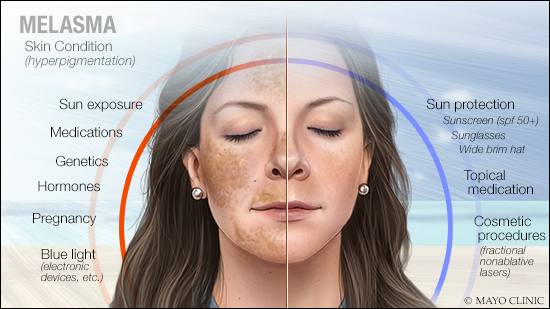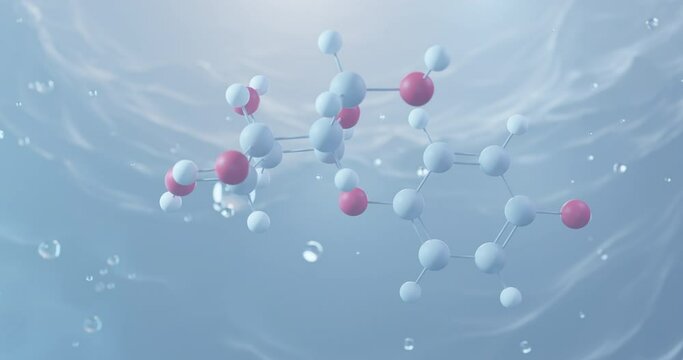Melasma in fact can fade on its own. This is frequently the case when the causes for the melasma are gestation or birth control capsules. By saying this, it means that if a woman delivers a baby or takes the birth control capsules, melasma will appear as a result of the mentioned action. So latterly when the woman delivers the baby or stops taking the birth control capsules, melasma can automatically fade.
Different from the case over, numerous people, still, have melasma which lasts for times or indeed worse a continuance. Melasma accordingly can seriously affect one's outside appearance, which leaves the affected people in a veritably shy and saddeningstate.However, there are stacks of melasma treatments available out there to try, If it happens that the melasma doesn't go down.
For more information about Melasma and booking appointments for Melasma Treatment in Dubai, visit our website.

Topical agents:
1) Hydroquinone:
Hydroquinone can be considered the most constantly specified depigmenting agent worldwide. By this, it has come the most popular system of treating melasma. Preparing hydroquinone for Melasma Treatment in Dubai can be at attention from 2 to 5 applied formerly daily. The depigmenting goods of hydroquinone treatment come apparent after 5- 7 weeks. Treatment with hydroquinone should be continued for at least 3 months and up to one time. Also in fact, hydroquinone is also combined with other agents like sunscreens, topical steroids, retinoids, and glycolic acids for fresh benefits.
What you should be apprehensive are the reversible goods from using hydroquinone for your melasma treatement. vexation is the most common effect, other adverse goods are erythema, surcharging, colloid bump, irritant and antipathetic contact dermatitis, nail abrasion, flash hypochromia, and paradoxical postinflammatory hypermelanosis. This is what can be seen when treatment of melasma with hydroquinone is at attention advanced than 2.
Being questioned about its safety to the druggies, hydroquinone has been banned in ornamental medications in numerous countries.

2) Azelaic acid:
Azelaic acid is an acid originally developed as a topicalanti-acne agent, azelaic acid can also be used to treat hyperpigmentary diseases like melasma.
The good news is that a study has shown that a 20 attention of azelaic acid was original to 4 hydroquinone when treating melasma, but without its side effects. Another controlled study has proven azelaic acid to be superior to 2 hydroquinone. Combined operation of azelaic acid with0.05 tretinoin or 15- 20 glycolic acid can affect in earlier plus pronounced skin lightening. Adverse goods of azelaic acid are pruritus, mild erythema, and burning.
3) Kojic acid:
Kojic acid is used at attention ranging from 1 to 4. In numerous studies, kojic acid combinations with other topical agents are proved inversely effective with a reduction of saturation in 52 of the cases. still, the adverse ffects can beget contact dermatitis and erythema.
4) Retinoids:
Retinoids in the form of retinoic acid can be used in Melasma Treatement in Dubai. The acid, compared to hydroquinone, takes a much longer time to act putatively after 24 weeks.
Retinoids has produced a good remedial response in clinical trials but better results are attained in combination with hydroquinone and corticosteroids. Also be apprehensive of side goods similar as erythema, burning, surcharging, blankness, and scaling or hyperpigmentation in people with dark skin. Cases thus must be advised to use sunscreens during treatment with retinoids.
5) Topical steroids:
Topical steroids are used in combination products for their synergistic goods and for the reduction of vexation from other products like tretinoin. colorful combinations with hydroquinone and retinoic acid have given good ornamental results in clinical trials. Adverse goods of topical steroids include vexation, rosacea- suchlike dermatosis, atrophy, telangiectasia, and hypertrichosis.
6) Glycolic acid:
Glycolic acid is generally used in combination with other agents at a attention of 5- 10 for its skin- lightening property. The medium of its effect might produce quick color dissipation on pigmentary lesions. It also directly reduces melanin conformation in melanocytes by tyrosinase inhibition.
A expression of 10 glycolic acid and 4 hydroquinone has been proved to have a good clinical efficacity in treating melasma. vexation was a common side effect.
7) Mequinol:
Mequinol is a outgrowth of hydroquinone with unclear medium of action; still, it's still being used at a attention of 2 in combination with0.01 tretinoin as a penetration enhancer to treat melasma. In a study, a expression of mequinol 2 and tretinoin0.01 result was set up to be largely effective and well- permitted treatment for solar lentigines and related hyperpigmented lesions, being superior to hydroquinon. The result has shown that 4 out of 5 cases achieved complete concurrence at 12 weeks, and one case showed moderate enhancement. Side goods were minimum and comported of surcharging in one case. All cases maintained good results at the 16- weeks' follow- up visit.
8) Arbutin:
Arbutin, also a outgrowth of hydroquinone, is a naturally being factory product used successfully in the treatment of hyperpigmentary diseases including melasma.
The action of arbutin is cure-dependent and less poisonous than hydroquinone, which produces reversible skin- lightening by direct inhibition of tyrosinase. Studies have demonstrated that it could be a safe and effective melismas treatment.
Experiental agents
• N- acetyl-4-S-cysteaminylphenol
• nascence- tocopheryl Ferulate
• Ascorbic acid
• Niacinamide
• Liquorice derivations
• Flavonoids
Procedures
Still, a procedure may do, If topical agents aren't effective enough to exclude your melasma. Procedures for melasma performed by dermatologists include a chemical peel( similar as glycolic acid), microdermabrasion, and dermabrasion. New skin problems can do when the person who gives the treatment doesn't conform it to the case's skin type.
Ask your dermatologist about possible side effects (health problems that can affect from the treatment) previous to the treatment at stylish.
Call your dermatologist when notice any of the following after Melasma Treatment in Dubai:
• Skin vexation.
• Darkening of the skin.
• Other problems.
Checkout Laser Treatment in Dubai for more treatments and information.



1 Comments
This comment has been removed by the author.
ReplyDelete